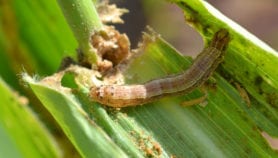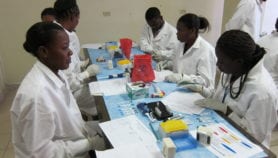By: Esther Ngumbi
Send to a friend
The details you provide on this page will not be used to send unsolicited email, and will not be sold to a 3rd party. See privacy policy.
The Next Einstein Forum in collaboration with Elsevier published its first edition of Scientific African journal in November 2018.
In the African context, it will join many more open access journals from the African continent including journals such as the African Journal of Food, Agriculture, Nutrition and Development and the African Crop Science Journal.
Through this open access journal and others on the continent, African scientists and innovators will have a platform to publish peer reviewed research including those that address concerns linked to United Nations Sustainable Development Goals.
This is a great move in the right direction. Science and the resulting discoveries can fuel progress and facilitate development of innovative solutions to many of the challenges the African continent faces including climate change, food insecurity, poverty, and hunger and water shortages.
Publishing research in peer-reviewed journals is important for scientists and has many advantages including validating and increasing the credibility of the research that is coming from the African continent, the scientists doing the research and the institution where researchers do the work. All these have a positive and significant impact on the advancement of science and researchers’ scientific careers.
Great move but impacts matter
However, while giving African scientists a new platform in which to publish their findings is a great move, it is the end impact of the published discoveries that will matter most. Was this research translated into products such as biofertilisers and other soil amendment products, and irrigation technologies that can be used by African smallholders? How widely was the public reached? What impact did the findings have towards contributing solutions to the current challenges that Africa faces? Did the research findings translate into meaningful partnerships? Were philanthropic organisations such as the Bill and Melinda Gates Foundation impressed by the research findings, prompting them to invest in funding more research?
“While giving African scientists a new platform … is a great move, it is the end impact of the published discoveries that will matter most.”
Esther Ngumbi
Alternatively, in the end, would these research articles join many other peer-reviewed articles that end up stocked in scientific journals? Globally, about 2.5 million peer-reviewed articles are published annually. Sadly, the public never reads many of these articles. To have wide impact and help accelerate progress to achieving the Sustainable Development Goals, African scientists and journals will have to do more than publish peer-reviewed papers. Research cannot merely end at the publication stage.
Going beyond publishing
So, once African researchers have published their journal articles, what are some of the things they can do to encourage and facilitate the use of their novel scientific discoveries?
They can write about them for other publications while linking to the journal articles. This could include writing columns in their local newspapers, opinion pieces and policy briefs and doing interviews with their local radio and television networks. One example of an outlet that focuses on new research is The Conversation Africa. (Also, SciDev.Net’s Script training course that teaches researchers how to communicate their works more effectively can enhance their skills in disseminating them to the general public.)
Regardless of the platform, the researchers need to show how their research will benefit the public and why it matters.
Moreover, researchers can make the most of technology and social media. They can summarise the main findings of the research and their possible applications and share them too widely using social media outlets including Facebook and Twitter. In fact, sharing on social media can be beneficial, as studies show that disseminating scientific findings in this way can increase the citations as well as the use of results.
I am a scientist from Africa, specifically coming from Kenya. I can attest to what can happen when scientists make their research findings widely accessible. My research on beneficial soil microbes that showed that soil microbes could help plants to tolerate drought stress led to into three US Patents, and opened up opportunities for us to work with industry partners including Bayer Crop Science in an effort to translate our discoveries into meaningful agricultural products. I tweeted about it and wrote an opinion piece about the overall research our lab was doing.
What really excites me about the Scientific African journal is that it will be open access, meaning these original research findings will be available and free to the public and to other key actors including industry who can build on the published novel scientific discoveries, allowing for more impact and innovation.
The journal will charge $200 as open access journal publishing fees, which, is a reasonable price. The average price for publishing can vary depending on the region and the journal. For example, a study reported that, publication to open access journals in Western countries such as Canada and the United States cost on average a little under US$2000. High publishing costs can prohibit publishing in open access journals. Therefore, this reasonable price should allow many researchers from the African continent to publish their results.
“The journals and scientists must actively disseminate the findings.”
Esther Ngumbi
Indeed, peer-reviewed open access research coming from the African continent could allow the birth of novel partnerships, especially so with industry and other private institutions that can help translate these findings into products such as pest control products and soil sensors that can allow farmers to determine the health status of their soils.
Turn findings into products
To truly tackle Africa’s challenges, policymakers and innovators will need to rely heavily on science and the discoveries stemming from scientific research. But they will have more success if the findings are translated into products such as weather apps, portable water pumps, portable HIV and other disease testing equipment and crop improving products such as biofertilisers and other soil amendments to boost agricultural productivity. Thus, science must not only end in the journals.
Esther Ngumbi is a distinguished postdoctoral researcher with the Department of Entomology at the US-based University of Illinois at Urbana Champaign, a World Policy Institute Senior Fellow, Aspen Institute New Voices Food Security Fellow, and a Clinton Global University Initiative Agriculture Commitments Mentor and Ambassador. She can be contacted at [email protected]
This piece was produced by SciDev.Net’s Sub-Saharan Africa English desk.
References
[1] Scientific African First journal edition (Scientific African, November 2018).
[2] The AIMS Team Why is it important for scientists to publish their work, and tips for submitting to F1000 Research (The AIMS team, 26 April 2016).
[3] David Nicholas and others Peer review: still king in the digital age (Learned Publishing, vol 28, January 2015).
[4] Mark Ware and others The STM Report: An overview of scientific and scholarly journal publishing (University of Nebraska – Lincoln, 2015).
[5] The Conversation Africa (The Conversation Africa, 2019).
[6] Gunther Eysenbach Can tweets predict citations? Metrics of social impact based on twitter and correlation with traditional metrics of scientific impact (Journal of Medicine Internet Research, October-December 2011).
[7] Clayton T. Lamb and others Tweet success? Scientific communication correlates with increased citations in Ecology and Conservation (PeerJ, 12 April 2018).
[8] Esther Ngumbi Mechanisms of olfaction in parasitic wasps: Analytical and behavioural studies of response of a specialist (Microplitis croceipes) and a generalist (Cotesia marginiventris) parasitoid to host-related odor (Auburn University, 6 August 2011)
[9] Open Access (Open Access, 2019).














